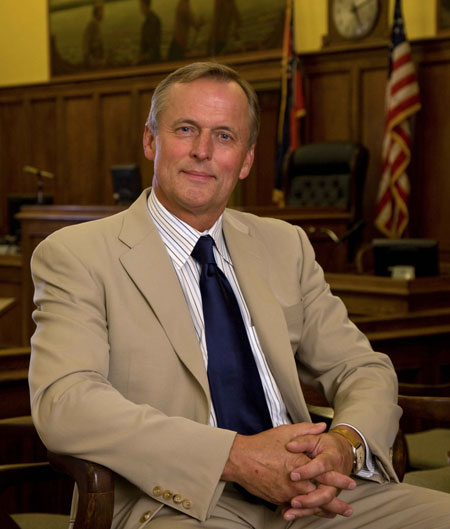
Bestselling author John Grisham spins tales from his early writing days—including the $6 million worth of first editions he once had in his law office—and talks about his current spectacular success, which includes new legal thriller The Litigators and a planned 2012 TV series, The Firm.
"More often than not, I will take an issue and weave a novel around it...whether it's capital punishment in The Chamber or homelessness in The Street Lawyer or tort reform in The King of Torts or tobacco litigation in The Runaway Jury. I think those are the better books."
John Grisham, born in Jonesboro, Arkansas, in 1955, lived in several small towns throughout the South before his family settled in Southaven, Mississippi, in 1967. During the heart of Grisham's childhood, he and his baseball-loving siblings lived in the Memphis area, where they lay awake each night listening to announcer Harry Carey's play-by-play of St. Louis Cardinals games on the radio. "We would actually argue about which of us was going to play what position, one day, for the Cards," Grisham remembers. "The dreams were that real." And John dreamt the biggest: "I wanted to be a star, I mean—I wanted to be the next Stan Musial. I wanted to bat cleanup, and play the outfield, and—be Stan the Man."
John Grisham never got close to playing pro ball; he says, "I barely made my high school team." But in time, he achieved the essence of his dream: He became an undisputed all-star, a Hall of Famer, in his chosen game. For over a decade, he has been one of the world's bestselling novelists.
We spoke with John Grisham recently in Charlottesville, Virginia, before an audience of 600 people in the Culbreth Theatre, during the Virginia Festival of the Book. Here is an abridged version of that interview.
Tom Nolan for Mystery Scene: In the late 1980s, you were practicing law in the state of Mississippi, and had been elected to the State House of Representatives, where you served for seven years. You were happily married, I presume. Whatever possessed you to separate yourself from your work and your family for however many hours a day, and commit a first novel?
John Grisham: Well, when I started writing what eventually became A Time to Kill, the first thing I'd ever written, my motives were pure. I had a story that I wanted to tell, based on something I'd seen in a courtroom; and I concocted what I thought was a really compelling courtroom drama, as seen through the eyes of a young attorney in a small town—very similar to myself at that time. I was happily married, but a struggling young lawyer.
And the story became an obsession.
Finally, one night I literally sat down with a legal pad and wrote "Chapter One"—and started writing this story. My wife and small son were in bed asleep, and I stayed up late that night, writing, for the first time in my life, something that was fiction.
I worked on it for a few days and finished the first chapter. And I read it, and I thought it was—pretty good. (audience laughter) My wife was an English major in college; and she reads five to eight, ten books a week, all different types of books. So I finally got the courage to say, "Look, I've got something I'd like you to look at, if you don't mind."
She said, "What is it?"
I said, "Well, it's a book I'm writing."
And she gave me that look, like: "Unh, here he goes again; some other scheme ..."
I gave it to her. I was so nervous, I went for a walk around the block; I couldn't be in the house with her when she was reading my first chapter. And when I came back, she said, "Well, this is pretty good; I'd like to read some more." And I said, "Okay, I'll go write some more and bring it back ..." (laughter)
And that's how it got started.
And even now, I'll write a chapter, and she'll read it; or now, like sections—100 pages or so—and she'll read it, and we'll talk about it—and sometimes argue about it. Sometimes yell about it. (laughter) The kids have sort of grown up over the years, with some yelling in the house. They realize: "Oh, it's just mom and dad, fighting over the book," so it's no big deal...
But that's how it got started. And it took three years. Took three years of really early mornings, and working late at night, and a lot of lost sleep, to finish the story. Now again, this is a long answer—and by the way, I give long answers.
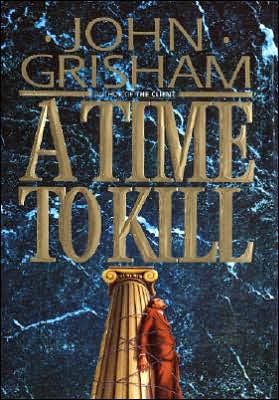 Fine with me.
Fine with me.
After about two years, when I realized I was halfway finished with A Time to Kill, my motives changed. I started thinking about getting published... I bought a book, the name of it was How to Become a Bestselling Author—written by a guy who never sold anything, but he got fourteen dollars from me. (laughter) I got really motivated to finish the book and to try to get it published...
Once A Time to Kill was finished, I spent a year submitting it to New York publishers. I'd read all these books on how you submit. I would copy the first three chapters. My secretary made a list of like thirty agents on one sheet of paper, and thirty publishers on the other; and we would do multiple submissions. She'd pick the first five on one list, the first five on the other. So at any given time, I had ten submissions floating around New York. And I'd send one batch off, they'd send them right back! They were coming back real fast!
The first one, by the way, was from Doubleday, my publisher for the past fourteen years... I kept that letter and shared it with them a few years later, and we all had a big laugh... But my secretary would go to the next name and cross it off, and just resubmit and resubmit and resubmit. And it was kind of fun. I mean, the mail was happening, something was going on. I was getting all these rejections... (laughter)
You know, I'd read so much about publishing that I knew there are wonderful stories about writers who get great books rejected twenty, thirty, forty times; I'd read all these stories, and so I wasn't really worried.
But one day I came in from work, and (my wife) Renee and I were having dinner. I was kind of down; I'd had a bunch of rejections that day. And we talked about it. She said, "Well you know, you're sending off the first three chapters of the book." I said, "Yeah, that's what you're supposed to do." She said, "Well ... the first three chapters are not the best ones in the book. Why don't you pick three other chapters?" And I said, "You mean, just pick three chapters at random?" And she said, "Yeah." And I said, "Well, that's pretty stupid. Who wants three random chapters?" And she said, "Well you're not doing so hot with the first three, so..." (laughter)
So I did. I went to copy the first chapter, the third chapter, and the seventh chapter; something really pivotal happens in the seventh chapter. I went to the next five names on the list, five agents, and sent some out. Within a week, three of the agents had called. So, around home I said, "Okay, now what do we do?"...
It took a year for my new agent to sell A Time to Kill to a very small, unknown, brand new publishing company in New York; the book was published in June of '89. I didn't have a lot of money in June of '89. But I had more than my publisher. (laughter)
That's not a good sign.
They printed 5,000 hardback copies of A Time to Kill, and I bought a thousand of them. (laughter) True story.
They actually shipped me 1,500 to my law office. And...I had to pay for them, of course. The little town we lived in at that time did not have a nice bookstore so our plan was to go to a local library, and I'd invite all my friends to come. I'd have 1,000 books there—and I'd make it both ways, you know; retail, and royalties later. I had it all figured out.
Well, we had a wonderful book party.... We've got pictures of my kids, and they're real small, next to this mountain of books. And when the party was over, I still owned 882 copies of A Time to Kill...
And so for the next year, I sold them out of the trunk of my car, to libraries and bookstores and finally got rid of them.
The funny part of the story is: At one point I had 1,500 copies of that book in my law office; I mean, you couldn't walk in there. And a first edition now sells for something like four thousand bucks. So you can do the math.
That is a funny story.
Yeah. That's real funny. (laughter) It wasn't the first fortune I lost practicing law!
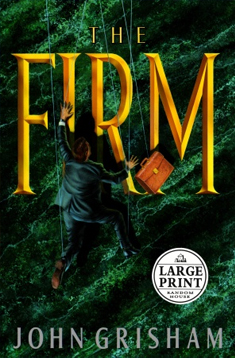 Given this return on your investment—what possessed you to write a second book? (laughter)
Given this return on your investment—what possessed you to write a second book? (laughter)
I'll tell you why I wrote the second book. I'd worked for three years with A Time to Kill, and I'd got in the habit of getting up at five o'clock every morning. My goal every day was to be at my law office at five-thirty, with my first cup of coffee, writing the first word. I did it for three years and it became a habit.
When I sent the manuscript off to New York, my agent was this old really sort of crusty New York guy that'd been around forever, and I called him and said, "Okay, what happens now?" He said, "Look, don't call me every day, okay?" He said, "Let me give you some advice: You start writing another book right now. It'll serve two purposes: Number one, by the time I sell this one, you'll have that one finished. But much more importantly, it'll keep you busy, and you won't be calling me every day."
And so, soon—it was one of those moments that we laugh about now, I'm always pitching ideas to Renee—I said to her, "Okay, I need five minutes, I got an idea for a story." She said, "Okay, what is it?" I said, "All right—there's this law firm that's secretly owned by the Mafia. Nobody knows. It's in a small city; and once you go to work there, no one ever leaves the firm." Blah blah blah. And—I thought I was in trouble again.
Renee said: "Wait a minute. Wait a minute. Do that again. Do that again."
And I pitched again. And she said: "That, is a big, book."
And I said, "Okay. I like that idea." I'd worked so hard with A Time to Kill, over a three-year period, that The Firm was just a naked grab for money, okay? (laughter, applause) It's hard work, and if I'm going to do it, I'm going to try to get paid doing it, okay? And honestly, that's what it was.
And it worked.
Still works ...
Anything interesting happen with that second book that was different from the first book?
Oh, everything was different from the first book! I sent the book to New York in the fall of '89, just after A Time to Kill was published. My agent suggested that I make some changes. There were changes I didn't want to make, and I didn't think his ideas were good, and so we sort of argued for a while. And once he realized I wasn't going to change it to suit him, the book sort of languished in New York throughout the fall of '89. I mean there was no stampede, no rush to buy The Firm. It was just sort of lying there, and I was writing book number three.
Because by then, I'd written two books back-to-back, over a five-year period, and it had become sort of a habit.
And unknown to us—and this is the luckiest break I've had in publishing, and I think everybody at some point has to have a lucky break—unknown to my agent, unknown to anybody, a copy of The Firm was stolen from a publisher in New York—a publisher who hadn't read it yet—and it surfaced in Hollywood, sort of a bootleg copy of the manuscript. And a guy got it out there, and made twenty-five copies of it, and give it to every studio, and sort of gave the impression that he was my representative.
Again, this happens all the time, believe it or not, as I've learned.
What I'd hoped to do, with publishing the second book, hopefully, was go from 5,000 copies of A Time to Kill maybe to 25,000 copies of The Firm, then 50,000—and gradually build a readership, so one day I could do it full-time. That was my dream: to leave the law office and just write. It's a wonderful dream, and that was my goal.
During Christmas of '89, we hadn't heard anything from New York in a long time. We were talking one night, and I said, "Wouldn't it be great if we got like a $50,000 advance for The Firm? I mean, that would take care of a lot of problems." And the first week in January—Sunday morning—I had left to go to church, because it takes like three cars to get us to church down the street, and Renee came in late, and she said, "You've got to go call New York."
Well—these (New York) people don't work on Sundays. They don't work on Fridays, or Thursdays. (laughter) I said, "What are you talking about?" She said, "Your agent just called. Something big is about to happen, you've got to talk to him right now."
I raced home. I called my agent in New York, and he said, "I need your permission to take the highest offer from Disney, Touchstone, Paramount, or Universal Pictures for the film rights to The Firm."
And I said, "Slow down, we haven't sold the book rights yet." He said, "I don't have time!" (laughter) He said, "These people in L.A. are sitting by their phones for the final round of bidding."
Well the word bidding had a real nice ring to it... And I said, "Well okay, sure, uh, just for fun—how much money we talking about?" He said, "I'm going to try to get $500,000." I said, "And you want my permission to go do that? Okay, you have my permission."
And I went back to church with Renee. And I was sitting through the worship service; you can imagine what we were thinking about. It wasn't the sermon.
We raced home, and literally the phone was ringing. It was my agent. He said, "We sold the film rights to The Firm to Paramount Pictures." Then he proceeded to tell me all of the hard-nosed negotiation he had done. I said, "Okay okay okay—just for fun: How much money did we get?" And he said, "Six hundred thousand dollars."
I said, "You were hoping to get five, how'd you get six?"
He said, "I'm just a helluva agent." I said, "Amen, brother. Amen."
We sat down... Renee and I both come from these very close-knit, conservative Southern Baptist families; and we were both raised to never talk about money outside the family. There was no money inside the family, but—you never discussed money, okay? And we knew what we had just gone through was about to change everything. So we told our parents; her mom and dad lived on one side of the house, and my parents lived behind us. We said, "Okay, it's going to be a movie. Maybe it's going to be a book, too, but it's going to be a movie!" (laughter) Of course everybody wanted to know: how much did you get? And we said, "We're not going to talk about the money, we just feel very uncomfortable talking about the money."
Well, Monday morning, Paramount issued a press release, with all the details in it. And that's why that's the only deal I'll ever talk about publicly, because it was publicized.
A couple weeks later, we sold the hardcover/softcover rights to Doubleday and to Dell. And throughout the course of 1990, we sold off the foreign rights. A Time to Kill never went to paperback, let alone foreign rights. So it was fascinating: You write it one time in your own language, and it sells in forty more.
Then when the book came out, in March of '91, it had a lot of buzz, a lot of pressure behind it, and became a big book.
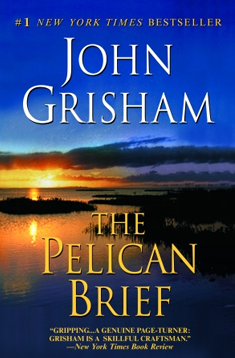 Now that your situation had changed so much, was there a lot of pressure for the book after The Firm?
Now that your situation had changed so much, was there a lot of pressure for the book after The Firm?
We always are pulling for the new guy, whatever it is, whether it's books or movies or sports. We always love the rookie, and all of that. Then we can't wait to see him stumble. That's the way we are: we love the underdogs, but we want people to be kept in their place. I knew the next book, whatever it was, was going to be hammered. So I made a decision—looking back, it was one of the wiser decisions I made—to get the next book out the following year, and go ahead and get the thrashing over with. And I got the thrashing, and I got it over with. I'm still getting thrashed, but I don't care any more. (laughter)
You were happy with the (third) book, though, right? You liked that book just as well as the others?
As time goes by, I look back, I like some books more than others. It's hard to believe there've been fifteen of them now; that doesn't seem like it's possible. But you do at least a book a year for twelve or thirteen years, and you wake up and you've written fifteen.
You have to like a book a lot, you have to love a story, to be able to finish the book. But then when I finish it... I don't dwell on the current publication ... It's time to start thinking about the next book.
As time passes, obviously, I think some are better than others. There are a couple, I think, looking back, that probably weren't very good at all, in my estimation.
But when you do a book a year, I mean—you write the best story you have that year.
And that's what I'm thinking about now. You know, I'm going to do a book this year, and—it's time to pick a story and go.
And when I start a book, I truly think: "Okay, I'm going to make this the best book yet." And—I mean, I take it very seriously, and I try, whatever type of book it is, to make it the best one yet. Sometimes I get close, and sometimes I don't.
You've said that some of your books are maybe a bit more serious or issue-driven than others?
Well, probably more often than not, I will take an issue and weave a novel around it. I do that to—not expose the issue, but just to explore it, to make people stop and think about whatever the issue is, whether it's capital punishment in The Chamber or homelessness in The Street Lawyer or tort reform in the current book (The King of Torts) or the tobacco litigation in The Runaway Jury. I think those are the better books.
At the same time, what I try to do—what I strive for—is a high quality of popular fiction. That's what I'm trying to write. It's entertainment. And I've never been pretentious about it. I want it to be real good—and I work hard at making it good.
There are times when I don't want issues; I want pure suspense, with a lot of mystery in it. There are times when Renee says, "Please stop preaching and just write a book?" And things are pretty testy around the house when she says that, so... (laughter) I'll go off and write The Summons, or I'll write The Brethren...
Were you a great reader, as a kid?
Yeah, my mom didn't believe in television. She just didn't. We moved around a lot when I was a kid, a lot of little small towns in the deep South, and the first thing we'd do was always join the local Baptist church, and the second thing would be to get our library cards. We would judge the quality of the new town by the number of books you could check out. And also by the quality of their Little League baseball field. My brothers and I could judge a town in a couple hours ...
We always had stacks of books around the house. It was a big family; we would read each other's books, and my mother would read to us. And I grew up loving to read.
I had the benefit of some really good high-school English teachers, who made us read great literature, and taught us how to. In Mississippi, there's a state law that you have to read Faulkner. (laughter)
I didn't know that.
Yeah, well—it's on the books.
It's a good law.
Every school child in Mississippi has to read Faulkner. I had a great teacher who also let us read, like, Steinbeck. So, when I was a senior in high school, I was reading Faulkner, you know, with a migraine—and Steinbeck, who I just adored, because you could understand what he was saying. (laughter)
I mean I never dreamed about being a writer, but when I read The Grapes of Wrath, I remember thinking, "If I could write, that's the way I would want to write." You know: clear, but also with passion, and meaning.
Did you read mystery writers, too?
When I was a kid I read a lot of them, yeah. All the Hardy Boys... (laughter) All of those.
Were you encouraged to write?
Never. No, I never thought about writing. I thought I was going to be an athlete, professionally. Wasn't sure which sport; didn't really matter, I'd figure one out. But I was never recruited, so that was a pretty good indication that I'd...need to study... (laughter)
And somehow I ended up in law school, and I thought I would do that for the rest of my life—until, like I said, I was inspired to write. I was thirty years old. It was 1985 before I started writing.
And how long did you keep practicing law?
That phone call, on The Firm? I think the next day. (laughter) It didn't take long. The legal career, and the political career, went by the wayside real quick, after that phone call.
Do you miss politics?
I don't miss being an elected official; that was really painful. I was elected twice to the House of Representatives in Mississippi. The campaigns were fun, but the job itself was drudgery. I love to watch politics, and I follow politics and keep up with it and get involved a little bit with some candidates I like...
Did you have a high point in your political career?
The day I announced I was not going to seek reelection. It's the last time people stood up and cheered for me. (laughter)
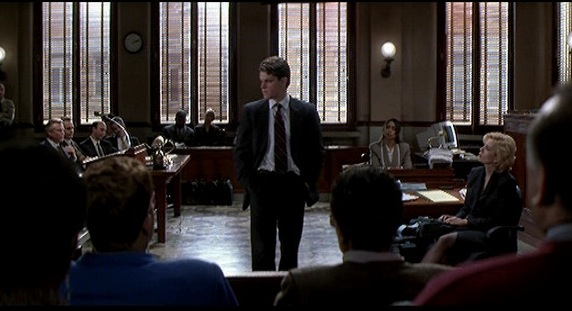
So, you got involved with these Hollywood people pretty early on. Was that interesting?
Oh, it's a fascinating bunch of people, yeah.... I've never gotten too close to them.... I'll read the script, and make a lot of notes on the script; try to keep the story together. My contract now, I can negotiate certain rights. I don't want to cast for the movies, but if they're trying to cast someone that I really don't like, I can steer them away from that. If there's a director I really don't like, you know, I can request someone else.
But if you start making those choices, you sort of get sucked into the filmmaking process, and I know nothing about it, and I don't want to learn.
But listen: I've had six movies, and I've enjoyed watching five of them. That's pretty amazing.
The Chamber was a train wreck from the very beginning, and a lot of it was my fault. ...The best one is The Rainmaker (applause), with young Matt Damon, and Danny DeVito; Francis Ford Coppola did the movie. I loved the movie... It came out one week before Titanic—so nobody went to see it. But it's the best adaptation.
I met Stephen King a few years ago, at a book festival, in Mississippi... We hung out together for a couple of days, and we were talking about movies. This is a guy who's had forty movies made of his books, or stories... and he said, "Let me give you some advice. When it comes to dealing with Hollywood, there are two groups of writers. There are those who do not deal with Hollywood, okay? Period. That's a small group. The second group consists of those of us who do. And if you're in the second group, there are a couple of simple rules: Get all your money up front; kiss the book goodbye; and expect the movie to be something different. If you don't like that—go join the first group." I thought that was great advice, and I've stuck to it.
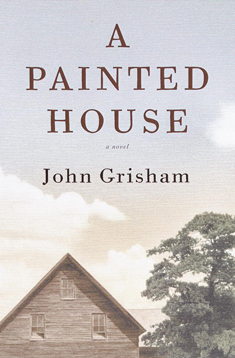 You said you had some books you sort of prefer or think better of; do you have one that's your all-time favorite?
You said you had some books you sort of prefer or think better of; do you have one that's your all-time favorite?
For years it was A Time to Kill; that was my favorite because it was close to home and all that.
I really like A Painted House. There are no lawyers in it. (laughter) I do get tired of writing about lawyers, occasionally... It's just a different kind of book; it's a childhood memoir, it's a lot of family lore, and there's a lot of autobiography in it; so I think now Painted House is probably my favorite.
Audience question: Do you still get up at five, to write?
Yes, I still get up at five o'clock in the morning. Well, I get up at six. Old habits are hard to break...
The schedule hasn't changed in probably close to ten years now. About this time of the year (March), I'll tell Doubleday yes or no on a book for February first of next year. Then we work back. For them to publish February first, they've got to see a good first draft by November first. And then to do that I've got to work real hard in September, October, and November.
But it's time to start the story really by the time school's out; I'll start doing a page or two a day, and that's usually at six in the morning. Maybe three, on a good day, throughout the summertime. And then, when the kids go back to school after Labor Day, I kind of go in my office and lock the door. There are no phones or faxes in my office, and it gets real dark over there, especially at six in the morning. And I work real hard from six to about eleven or twelve, for the first three months...
I'll spend the month of November doing revisions, which is the least attractive part of it. I'm determined every year to be finished by Thanksgiving. Then they start printing the books December the first, in Berryville, Virginia, just up the road. They print 100,000 a day, for a month.
I actually took my daughter's fourth-grade class to Berryville on a field trip. They were printing The Partner, at like 100 a minute or so. It's kind of fun to watch. Yanked one off the press and signed it for all the kids...
They ship them to the warehouse in January, and they have them in the stores the first Tuesday in February. And that's what's going to happen next year, if nothing bad happens to me. I've got the story.
Audience question: Do you work from an outline?
I work from a real extensive outline. When I think I have a story, I'll say, "Okay, Chapter One"—and write a paragraph about Chapter One. And Chapter Two—and all the way through Chapter Forty.
Forty chapters, at ten pages each, is what I shoot for. They're getting thinner—because I'm getting lazier. The price is not going down, though. (laughter) And they're all from 375 to 500 pages. I think a lot of popular authors get in trouble, because their books just get thicker... Anyway, the outlining process can go on for a long time, even a year or two. But it makes you see the whole story. And when you write suspense it's sort of like writing mystery: you have to drop off clues along the way, you have to make sure you've got your main plot that works, and your core subplot that works. And you've got to be able to see that when you start. You can't predict everything that's going to happen; you can't predict every character you're going to come up with. But I've been in trouble twice, in fifteen books—trouble, meaning I was really worried about a deadline because I couldn't get the story finished—and both times, it was because I'd cheated on the outline. If my outline is in good shape, the book is real easy to write.
Outlining is nothing fun, and the revisions are painful. But I tell students and writers all the time, if you're not willing to do those two things, then you're not going to make it as a writer.
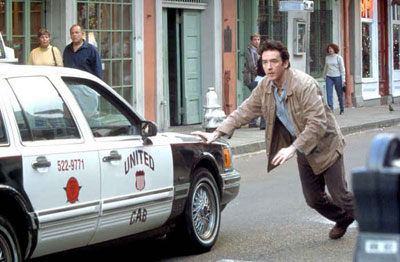 Mystery Scene: Do you ever depart from the outline, comfortably?
Mystery Scene: Do you ever depart from the outline, comfortably?
I don't think so. I can't remember doing that. I'd be afraid to. Especially the way I back myself into a corner with time? I mean, I don't have a lot of extra time! If I had a good case of the flu in October, it would be trouble.
Audience question: How do you develop your characters?
How do I develop my characters? Well, the critics say that I do not! (laughter) And you know, some of that's fair; I'll tell you, it's fair.
When you write suspense, you have to sacrifice certain things, to keep the pages turning. And I deliberately try to make the pages turn. I want people staying up late at night, calling in sick for work... That's what I want.
It's not always easy. But to do that, you've got to sacrifice certain things. You've got to sacrifice things you would like to explore: people, relationships, setting, places, culture, food.
I did that with A Time to Kill. The first draft was some 1,000 pages, because I chased every wild rabbit I wanted to chase. A lot of it came out, but a lot of it stayed. Because it's the only book I've written with no deadline. It's probably the best book I've written.
I try to find characters—You've got to start with your principal character, it's got to be somebody that your reader cares about. And that's the hardest one. You've got to get them in trouble, and you've got to get them out. And your readers have got to care about that person when they're in trouble, or you've lost them. That's basic suspense, and I did not invent it. I heard it from Robert Ludlum...
Audience question: Who do you read, for your own enjoyment?
I'm in the middle of all of the great Raymond Chandler novels, the Philip Marlowe novels? I don't know why, I started reading them last fall, and it's some of the best stuff I've ever read.
I read most of the other lawyer/authors, just to kind of monitor the competition? Some are good; some are not too good.
Oh, my favorite author is a British guy, John le Carré—David Cornwell? He's a master of espionage and suspense; I love that guy's stuff. You know, Pat Conroy's a buddy. Of course he publishes once every ten years, so it's kind of hard to say you live for his books. I guess you do. (laughter)
Audience question: Do you have trouble thinking up a new plot every year or do you have them already lined up?
When you do what I do, and you watch lawyers, and you watch litigation and trends in litigation, and courtroom dramas, and the really colorful, wacky, crazy things that lawyers do—the material is endless. (laughter) I'm not kidding, the material is endless. As someone mentioned earlier: Enron, Worldcom—things like that just, pop up. And it really keeps me awake at night, wondering: How am I going to skewer all these lawyers?
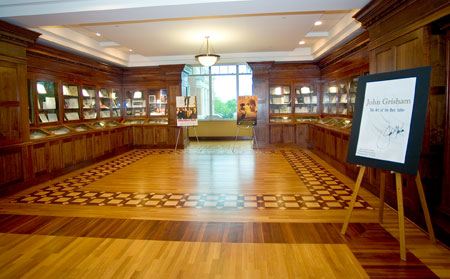 The Paper Trail
The Paper Trail
The John Grisham Room, located in the Mitchell Memorial Library on the campus of Mississippi State University, contains papers and materials donated by the author to his alma mater.
Included are legislative subject files from Grisham’s 1983-1990 service as a representative in the Mississippi Legislature; the original manuscript and various revisions of his first novel, A Time to Kill, as well as drafts of The Firm, The Pelican Brief, and The Client; various photographs of his legislative and literary days; correspondences, including fan mail, personal letters, requests for public appearances, and solicitations; and promotional materials and newspaper clippings.
A JOHN GRISHAM READING/VIEWING LIST
Novels
A Time to Kill (1989)
The Firm (1991)
The Pelican Brief (1992)
The Client (1993)
The Chamber (1994)
The Rainmaker (1995)
The Runaway Jury (1996)
The Partner (1997)
The Street Lawyer (1998)
The Testament (1999)
The Brethren (2000)
A Painted House (2001)
Skipping Christmas (2001)
The Summons (2002)
The King of Torts (2003)
Bleachers (2003)
The Last Juror (2004)
The Broker (2005)
Playing for Pizza (2007)
The Appeal (2008)
The Associate (2009)
The Confession (2010)
The Litigators (2011)
Theodore Boone YA Series
Kid Lawyer (2010)
The Abduction (2011)
Movies
The Firm (1993) Starring Tom Cruise, Jeanne Tripplehorn, and Gene Hackman; Directed by Sydney Pollack
The Pelican Brief (1993) Starring Julia Roberts, Denzel Washington, and Sam Shepard; Directed by Alan J. Pakula
The Client (1994) Starring Susan Sarandon, Tommy Lee Jones, and Mary-Louise Parker; Directed by Joel Schumacher
A Time to Kill (1996) Starring Matthew McConaughey, Sandra Bullock, and Samuel L. Jackson; Directed by Joel Schumacher
The Chamber (1996) Starring Chris O’Donnell, Gene Hackman, and Faye Dunaway; Directed by James Foley
The Rainmaker (1997) Starring Matt Damon, Danny DeVito, and Claire Danes; Directed by Francis Ford Coppola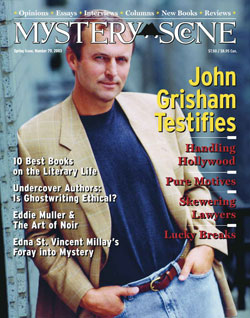 The Runaway Jury (2003) Starring John Cusack, Gene Hackman, and Dustin Hoffman; Directed by Gary Fleder
The Runaway Jury (2003) Starring John Cusack, Gene Hackman, and Dustin Hoffman; Directed by Gary Fleder
Christmas With the Kranks (2004) Starring Tim Allen, Jamie Lee Curtis, and Dan Aykroyd; Directed by Joe Roth
Tom Nolan is the author of Ross Macdonald: A Biography and the editor of Strangers in Town: Three Newly Discovered Mysteries by Ross Macdonald (Crippen & Landru).
This article first appeared in Mystery Scene Spring Issue #79.


